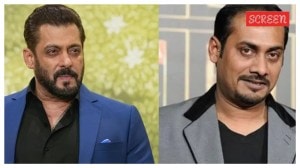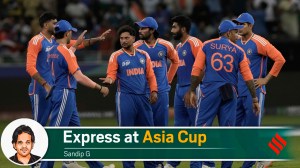If words alone could drive performances…
The Windies won the ODI series because of their grit, not because of the shallowness of a certain comment

The announcement, or should that be reminder, of the LG ICC rankings coincided quite neatly with a most stimulating book review I read on Amit Varma’s excellent blog, India Uncut. The LG rankings seek to evaluate individual cricketers in, and across, eras in what is essentially a team sport. And Malcolm Gladwell’s review of a book by a trio of economists addresses the very same issue.
When you have written books like the Tipping Point and Blink, the reviewer tends to overshadow the writers, but the points the authors raise, and Gladwell highlights, while questioning the value of Allan Iverson to the 76ers and indeed to the NBA are pertinent. It is far easier, for example, to compare Tiger Woods with Ernie Els or Roger Federer with Rafael Nadal but to compare a Brian Lara with a Ricky Ponting or indeed a Gavaskar with a Viv Richards can get really tricky.
While you must see the article to know more, one of the crucial issues it raises is the ‘win factor’. How much does a player contribute to a win? Iverson, the writers claim, scored many points and looked flashy but also missed many chances. Did that necessarily make him a valuable player? It is something that has often been talked about in a more qualitative frame. We often talk about ‘match-winners’, about players who, when they are in form, contribute significantly to winning matches. But we do not always look at the contribution made by many others towards making a particular player a match-winner. Or indeed to the percentage of situations they were successful in.
Sunil Gavaskar, for long, had the reputation of a match-saver, the kind of player who dug in hard, who built a fortress around himself. Richards was the glorious match-winner, the glamour cricketer who chewed gum and knocked the opposition around. When the time came to vote for the cricketers of the century, Richards made the top five. Could we have factored in the role played by Marshall and Holding and Greenidge and Haynes in softening the opposition? Or the fact that a Richards dismissal wasn’t the end of the world given that he was followed by Richardson or Kallicharan, Gomes, Lloyd and Dujon?
Would Kapil Dev have developed a greater win factor had he bowled with an equally good bowler at the other end? Would Shane Warne have been the same bowler without Healy and Taylor catching for him? Should Ramnaresh Sarwan be a better one-day player than say, a Herschelle Gibbs or a Mahela Jayawardene? Indeed, do Jayawardene’s impressive Test match numbers mean much in the context of a win factor?
Let us try and put that alongside some of the figures for the India v West Indies one-dayers; specifically with respect to Mohammad Kaif. He got three half centuries, averaged over 50 and the general opinion seems to be that he has come out of his bad patch. Or has he? He certainly got the runs but did he add to the momentum that India needed to win? Did he actually end up missing more than he got, to take a basketball parallel. My own view is that he merely generated numbers and you will see a lot of those players around in world cricket.
By contrast, Sehwag generated momentum in the two games in which he got going and that should fill him with confidence in Test cricket, where he becomes an excellent player as opposed to merely a good one in one-day cricket (indeed the ‘win factor’ would show him up to be an over-hyped one-day player). I believe India will also benefit from the strength of Kumble who must play with Harbhajan for India must seek to put their best bowlers in rather than worry about what kind of bowlers they are.
Finally, while it is easy to get carried away into thinking that everything a winning team does is right, it is just as easy to believe that a losing team must only be wrong. And hence, we criticise Chappell’s perfectly legitimate comment about West Indies having forgotten how to win and worse still, the use of Dr Rudi Webster to help the team. Dr Webster isn’t a match winner but sometimes it helps to have a different voice telling you things, even if they are not too different. Good players don’t become bad overnight, they just need to start thinking positively again and there is no shame in seeking such help.
And didn’t Lara admit in his ‘sly comment’ press conference that Chappell was probably right at the moment? The West Indies turned it around because of their grit not because of the shallowness of a particular comment. If words alone could drive performances, no team would ever fail, every taunt would receive a stinging riposte.
–harsha.bhogle@expressindia.com
Photos



- 01
- 02
- 03
- 04
- 05



























